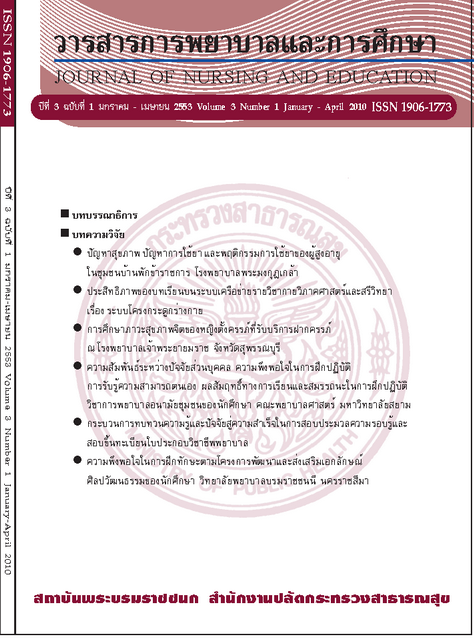การศึกษาภาวะสุขภาพจิตของหญิงตั้งครรภ์ที่รับบริการฝากครรภ์ ณ โรงพยาบาลเจ้าพระยายมราช จังหวัดสุพรรณบุรี
บทคัดย่อ
บทคัดย่อ
การศึกษาวิจัยแบบสำรวจนี้ มีวัตถุประสงค์เพื่อศึกษาภาวะสุขภาพจิตโดยทั่วไป
ของหญิงตั้งครรภ์ที่มารับบริการฝากครรภ์ และเปรียบเทียบความแตกต่างระหว่างปัจจัยด้านบุคคล (ได้แก่ อายุ ระดับการศึกษา อาชีพ ระดับรายได้ สถานภาพการสมรส) และปัจจัยการตั้งครรภ์ (ได้แก่ จำนวนครั้งของการตั้งครรภ์ อายุครรภ์ จำนวนบุตร เพศของบุตร อายุบุตรคนสุดท้อง การมีภาวะเสี่ยงในการตั้งครรภ์) กับภาวะสุขภาพจิตของหญิงตั้งครรภ์ กลุ่มตัวอย่างเป็นหญิง ตั้งครรภ์ที่มารับบริการตรวจครรภ์ ณ โรงพยาบาลเจ้าพระยายมราช จังหวัดสุพรรณบุรีในช่วงเดือน ตุลาคม 2550 – เมษายน 2551 จำนวน 400 คน เครื่องมือที่ใช้ คือ แบบสัมภาษณ์ที่ผู้วิจัยสร้างขึ้น และแบบประเมินภาวะสุขภาพจิตในหญิงตั้งครรภ์ของกรมสุขภาพจิต กระทรวงสาธารณสุข สถิติที่ใช้ คือ สถิติเชิงพรรณนา และสถิติวิเคราะห์เพื่อหาค่าความแตกต่างของค่าเฉลี่ยคะแนน ปัญหาสุขภาพจิตของหญิงตั้งครรภ์กับปัจจัยด้านบุคคลและปัจจัยการตั้งครรภ์ โดยใช้การหา ค่าเฉลี่ยของกลุ่ม (Group Means) และทดสอบความแตกต่างด้วยการวิเคราะห์การผันแปร (Analysis of Variance, ANOVA)
ผลการศึกษาปรากฏดังนี้
1. หญิงตั้งครรภ์ ส่วนใหญ่มีระดับความเครียดอยู่ในเกณฑ์ปกติถึงเครียดเล็กน้อยร้อยละ 83.5 มีความเครียดในระดับปานกลาง ร้อยละ 14.5 และมีความเครียดระดับสูงร้อยละ 2.0 ตามลำดับ
2. การเปรียบเทียบความแตกต่างของปัจจัยด้านบุคคลและปัจจัยการตั้งครรภ์ กับภาวะ สุขภาพจิต พบว่า ภาวะสุขภาพจิตของหญิงตั้งครรภ์แตกต่างกันจากการที่มีอายุ เพศของบุตร และภาวะเสี่ยงในการตั้งครรภ์แตกต่างกันอย่างมีนัยสำคัญทางสถิติที่ระดับ .05 และจากการที่มี จำนวนครั้งของการตั้งครรภ์ จำนวนบุตร และอายุบุตรคนสุดท้องแตกต่างกัน อย่างมีนัยสำคัญ ทางสถิติที่ระดับ .01 ส่วนปัจจัยที่ทำให้ภาวะสุขภาพจิตของหญิงตั้งครรภ์ไม่แตกต่างกัน ได้แก่ ระดับการศึกษา อาชีพ ระดับรายได้ สถานภาพการสมรส และอายุครรภ์
ข้อเสนอแนะจากการวิจัยครั้งนี้ คือ ผู้เกี่ยวข้องที่ดูแลสุขภาพจิตหญิงตั้งครรภ์ ควร ประกอบด้วยสามี บุคคลในครอบครัว และเจ้าหน้าที่สาธารณสุข สำหรับการดูแลสุขภาพจิต ของหญิงตั้งครรภ์ ควรมีการประเมินภาวะสุขภาพจิตในหญิงตั้งครรภ์ทุกรายที่มารับบริการ ตรวจครรภ์ ในรายที่พบปัญหาไม่ว่าจะโดยภาพรวมหรือปัญหาสุขภาพจิตเป็นรายข้อ พยาบาลควร ให้คำแนะนำปรึกษาตามสภาพปัญหา และส่งต่อเพื่อรับการวินิจฉัยและรักษา เมื่อมีอาการ ขั้นรุนแรง
ASTRACT
This survey research was aimed to study mental health status of pregnant women who came to antenatal clinic (ANC) service. The study focused on comparing between the difference of personal factors (age, education level, occupation, income level, and marriage status), the pregnant factors (number of pregnancy, pregnant age, number of children, sex of child, age of last child, risk factor of pregnancy) and mental health status of pregnancy. Samples were 400 pregnancy women who came to attended ANC service in Jaoprayayommaraj hospital Suphanburi province during October 2007 to April 2008. The study instruments were interview questionnaire, and The Mental Health Status Assessment for pregnant women by mental health office, ministry of public health. Statistics used in this study were descriptive statistics and analytical statistics to differentiate the means of mental health score between the personal factors and the pregnant factors, and tested the difference by analysis of variance (ANOVA).
The results were as follows.
1. Most of pregnant women (83.5%) had stress level between a normal level to a mild level, 14.5% in a moderate level, and 2.0% in a high level.
2. Comparing of the difference between personal factors and pregnant factors were found that mental health of pregnant women were significant difference in age, sex of child, and risk factor of pregnancy (p<0.05). Mental health of pregnant women were significant difference in number of pregnancy, number of children, age of last child (p<0.01). But education level, occupation, income level, marriage status, and pregnancy age were not significant difference.
This study suggested that husband, person in family, and health status can promote mental health of pregnant women. The mental health care staff of pregnant women should evaluated mental health of all pregnant women who came to attend ANC service. For the case with mental health, nurse should advised or counseling according to problem or situation, and referred any severe case for further appropriate diagnosis and treatment.






